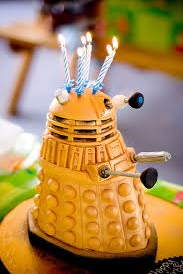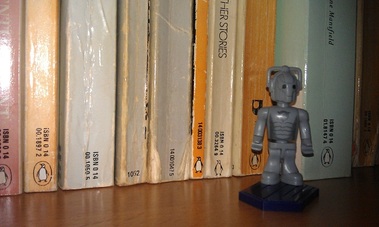
The show is now part of the family (although based on the number of children it has traumatised it’d probably be the creepy uncle that nobody likes to talk about) – you’d be hard pushed to find anyone in the UK who wasn’t aware of the basic premise even if you managed to find someone who’d never seen an episode. The characters are burnt into the public consciousness, even if they are slightly out of date (the Doctor hasn’t worn a long scarf in 30 years. He wears bowties now. Bowties are cool), so much so that the police force recently lost a court case to the BBC over the image rights for police boxes.

The show, although always popular, hasn’t always been the ratings juggernaut it is these days – and much of what we take for granted didn’t even exist in the early years. In fact it was a very different show – it was originally intended as an educational show with historical settings to educate children about various periods with future set stories to teach them about scientific matters. However, it was soon noticed that the more fun, sci-fi episodes dominated in the ratings and reviews and it was quickly rejigged as a space-based fantasy series.
Although classic villains the Daleks and Cybermen were both introduced in William Hartnell’s run it wasn’t until he decided to quit that it really became the show we know. The BBC, faced with a massive dilemma over the loss of what was by now one of their most popular shows, had a moment of genius and invented the concept of Regeneration, allowing them to replace the main actor of the show without having to completely rejig it. How different things may have been if they’d gone with their original idea of a spin-off called Son of Doctor Who!
After Hartnell came my favourite Doctor - Patrick Troughton (although Matt Smith is running a very close second and may eclipse him before his run is over – oh if only time travel was real, I’d love to seem them play off each other). His run featured the first appearance of the best non-Companion companion – The Brigadier. At the end of his run the last major plot piece was revealed - Gallifrey and the Time Lords.
Their appearance led to a new Doctor, played by Jon Pertwee. His run was the first to be shot and shown in colour, but sadly this meant the budget had to be reduced in other ways so most of his run had him exiled to contemporary (i.e. 1980s) England. However, it also introduced us to Sarah-Jane, played by the much missed Liz Sladen, later star of The Sarah Jane Adventures. He was the most physical of Doctors, known for his Venusian Kung-Fu and prepared to battle his foes with fists as well as minds.
Next up was Tom Baker’s Doctor – the longest serving Doctor. This alongside his distinctive acting and dress-sense makes him the archetypal Doctor for most people over the age of 15. His run coincided with a shift from the gothic horror of Pertwee’s run to a more comic style, largely due to Douglas Adams taking over as showrunner.
Peter Davison next stepped into the Doctor's shoes, Davison started the trend that modern Who has stuck with – that of a younger, more laid-back Doctor, one who treated his companions as friends rather than employees or minions like his more authoritative predecessors.
He was followed by the other Baker – Colin. Widely regarded (accurately, if somewhat unfairly) as the ‘worst Doctor’ he wasn’t helped by a truly hideous garish outfit that looked like it had been vomited up by a pantomime horse. His character was an egoist, mistrustful and irritable - as a result he was unpopular with the audiences and lasted three series before being sacked by the BBC. The bad blood over this led to him refusing to do his regeneration scene so McCoy wore the costume (and a truly terrible blond wig) during it.
As mentioned Colin Baker was replaced by Sylvester McCoy. His run started out quite lighthearted and was aimed at younger viewers but as it progressed became more political (and scathing of Thatcherite Britain), darker and hinted that The Doctor was more than just a Time Lord. Sadly the cancellation of the series meant these themes were never resolved (at least not on the TV, although the non-canon books touched upon them). The series ended with the BBC announcer saying that the show would return in the autumn. This was admittedly true but most viewers in 1989 probably weren’t expecting that the autumn in question would be in 2005!
Well that’s not entirely true. There was the 1996 TV movie. Although a lot of fans question whether it was canon (it claimed that The Doctor was half-human, something never mentioned before. Or since). Overall it wasn’t brilliant but Paul McGann was great in the role. Frankly he deserved a much better movie. If only they hadn’t dismissed his initial costume idea of shaved hair and a leather jacket (’cos obviously The Doctor would never dress that way) and forced him to dress like a foppish dandy it may have led to a new series. He was also the first Doctor to show a romantic side by kissing his companion (much to the disgust of some fans), something the 2005 relaunch would play with a lot more.
2005 brought us Christopher Ecclestone as a very different Doctor (and not just because he was a Northerner). Behind a manic facade he was a lonely, traumatised figure, broken by his actions in The Time Wars against the Daleks. His run was slightly ruined for me by the BBC announcing he was leaving at the end of the series mere days after the first episode was shown.
As blatantly spoiled by the BBC he regenerated into David Tennant - although outwardly one of the friendliest, outgoing chattiest Doctors he had a dark, unforgiving side and didn’t give enemies second chances. He is probably the archetypical Doctor for anyone under the age of 20 and he cast a large shadow over the role for whoever follows him.
Eventually he left (accept it fangirls – he’s as dead as Ianto!) and regenerated into the current Doctor – Matt Smith. His run coincided with Steven Moffat taking over as showrunner and has so far been characterised by more complex, time bending (I refuse to call them timey-wimey) storylines that reward repeat viewings and paying attention. Matt has already started dropping hints that he might not be around much longer after the 50th anniversary so in a few years we may have a new face for the beloved Doctor, but whoever takes over the roll will inherit a show at the top of its game and hopefully lead it on to even greater heights.
Gareth
 RSS Feed
RSS Feed
